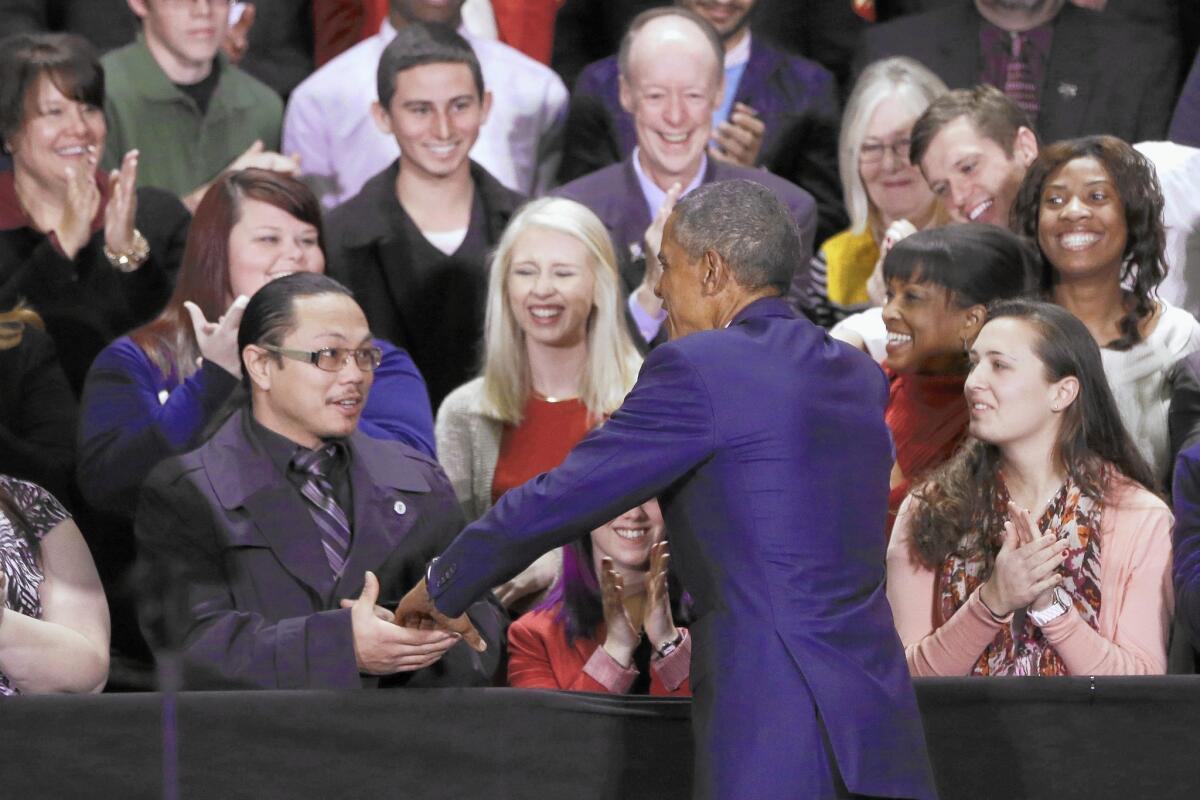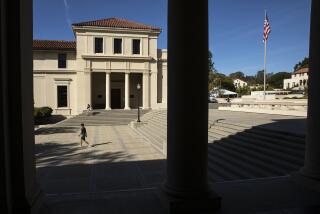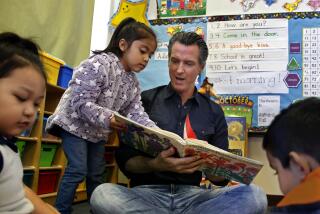President Obama pitches free community college plan at Tennessee school

President Obama traveled to this Southern city Friday to sell his new proposal for making community college as widely available as high school, the culmination of a tour outside Washington to promote policy initiatives aimed at the middle class.
In unveiling the proposal, Obama promised to “bring down to zero” the cost of tuition at community colleges and technical schools around the country.
“Two years of college will become as free and universal as high school is today,” Obama pledged.
The president laid out his vision at the Pellissippi State Community College here, a venue chosen as part of a familiar — if not entirely successful — White House playbook.
Obama is using a strategy he has employed on issues including raising the minimum wage and broadening pre-kindergarten education: talking about the subject in front of a friendly audience, and building on local initiatives already in place.
The community college plan has a template in Chicago and Tennessee programs that basically cover the cost of tuition for any eligible student who wants to attend a two-year college or technical school.
As the White House sees it, its two-pronged approach has been successful in the past, albeit not by the traditional metrics of the legislative process.
In 2013, Obama announced a similarly ambitious proposal in his State of the Union address to make preschool available to nearly all 4-year-olds. Then he traveled to a red state, in that case Georgia, to highlight a similar state effort already underway. When he put the plan in his budget, he proposed to pay for it with a 94-cent tobacco tax.
While Obama touted the idea in many of his speeches on middle-class initiatives as well as his midterm election stump speech, the proposal faced a slow and rough path in Congress. Even with Democrats in control of the Senate, it took months to write legislation and roughly a year before a hearing was held on the bill. The cigarette tax was left behind. There was scarce bipartisan support, as Republicans argued that current efforts should be improved before a new, $76-billion federal program was created.
Two years later, there’s little expectation that Obama will see his vision of “high-quality, universal” pre-kindergarten in his tenure.
Obama’s push to raise the minimum wage to $10 per hour was more swiftly embraced by Democrats, though saw no more success in Congress. His “Buffett rule,” a minimum tax on millionaires, was another State of the Union-friendly notion that has not been turned into law.
The White House, however, argues that the proposals have been successes. In the face of Republican opposition to any proposal that involves a major expansion of government programs or mandates, White House officials acknowledge that certain plans fit into their long-term outlook.
Both minimum wage and universal preschool have seen progress on the state and local level, building pressure toward eventual congressional action, officials argue. The White House maintains that by elevating the issues, Obama helped build that momentum — even if only to ensure a future president picks up where he left off.
“The president’s goal is for these to become national programs,” spokesman Eric Schultz said of the preschool and minimum wage initiatives. “All Americans should be eligible. But the progress we’ve seen is definitely heartening.”
The strategy demonstrates the limits of Obama’s ability to propose big new ideas at this stage in his presidency. With just two years left in office and a shrinking bully pulpit, Obama’s biggest moves are more likely to be ones he can accomplish without Congress, perhaps on foreign policy or through executive actions.
Until this announcement, Obama had not even hinted that he was looking to reshape higher education. Instead, both he and Republicans have publicly zeroed in on other targets for compromise in the new Congress. Approval of trade deals, new infrastructure spending and, perhaps, corporate tax reform top the list.
White House officials say that the community college program will have bipartisan appeal and there’s no downside to giving it a try against long odds.
Privately, though, they harbor little expectation that the Republican-led Congress will get to work on turning the president’s vision into reality. The idea, said a top White House advisor, “is just to start a conversation.”
Republican lawmakers who accompanied the president to Knoxville offered no hope that they would back the plan.
“Oh, no, no, no,” Sen. Bob Corker (R-Tenn.) said when asked Friday whether he would support the creation of a new federal program like the one Obama wants.
“You’re always better off letting states mimic each other,” he said as he stood in the audience for Obama’s announcement after traveling with the president on Air Force One.
The chairman of the House Education and Workforce Committee, Rep. John Kline (R-Minn.), said that encouraging more job training and improving access to college was a “national priority.”
“But make no mistake, the president is proposing yet another multibillion-dollar federal program that will compete with existing programs for limited taxpayer dollars,” Kline said. “Unless the president has a responsible plan to meet our existing commitments, he shouldn’t be making new promises the American people can’t afford.”
Aides to Obama say he will propose a way to pay for the program when he unveils it in his budget this year, but they have not made the case for it in this week’s announcements on the community college proposal.
Still, the president’s team is careful not to write off the possibility of legislative victory.
Republican lawmakers say publicly that they want to see a better trained and educated American workforce, Schultz said.
“We take them at their word,” he said.
kathleen.hennessey@latimes.com
Parsons reported from Knoxville and Hennessey from Washington.
More to Read
Start your day right
Sign up for Essential California for news, features and recommendations from the L.A. Times and beyond in your inbox six days a week.
You may occasionally receive promotional content from the Los Angeles Times.








